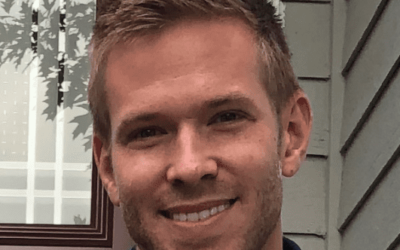What do you work on?
I am interested in how the world outside of academia uses Psychology and Neuroscience to address real-world problems. This broadly falls under the category of “neuromarketing” or “educational neuroscience”, although I’m not in love with either of those terms. In a nutshell, I am interested in using the methods, techniques and insights from academia to address real-world problems in robust, scientifically rigorous and novel ways.
What did you do using Gorilla?
We ran an experiment in partnership with Audible, that investigated whether people respond differently to emotionally engaging scenes when they are delivered in video or audiobook format. 102 volunteers (aged 18 – 55) watched clips and listened to audiobook scenes from eight blockbusters and bestsellers: Game of Thrones, Girl On The Train, Pride & Prejudice, Silence of the Lambs, Great Expectations, The Da Vinci Code, Hound of the Baskervilles, and Alien. Specific scenes from each title were selected based on their emotional intensity, comparative length, and similarity of narrative (i.e. minimal differences in the storyline between audio and video adaptations). The stories were presented using Gorilla and after each one, participants were asked about their engagement with the story. At the same time, we recorded implicit physiological measurements such as heart rate and electrodermal activity using biometric sensors on the participants because these physiological signals can reveal cognitive processing and sub-conscious emotional arousal in the brain.
“An analysis of participants’ biological data revealed that listening to audiobooks elicited a more intense physiological and emotional reaction than watching a screen.”
What was your study protocol?
Participants received information about the experiment and then provided informed consent. They then answered a few questions about their current mood, media experience, personality, etc before watching/listening to short excerpts from 8 popular books. These were either presented as videos (4) or audiobook (4) and participants then answered some questions about their experience and engagement with each story. At the same time, participants were wearing biometric sensors recording heart rate, galvanic skin response, body temperature, and acceleration (ie arm movement) data so that we had a combination of explicit, self-report measurements (from Gorilla) and implicit, physiological measurements (from the biometric sensors). This allowed us to compare the two and investigate the extent to which they provided complementary information about engaging with the stories.
What did you find?
We found that participants explicitly rated the videos as more engaging than the audiobooks but an analysis of participants’ biological data revealed that listening to audiobooks elicited a more intense physiological and emotional reaction than watching a screen. For instance, our volunteers had higher heart rates by an average of 2 beats per minute; their electrodermal activity (a measure of autonomic nervous system response due to emotional intensity) was higher and their body temperature was even 0.37C degrees warmer when listening to the audiobook clips relative to watching the videos. This is despite the fact that for both types of clips, participants were sitting in a quiet, darkened room. They even had higher highs and lower lows in their heart rates when listening versus watching, suggesting stronger emotional amplification. There is an example of these findings based on the scene in Game of Thrones where Ned Stark scene is beheaded available below, and on YouTube here.
We interpret our results as evidence that listening to audiobooks is a more emotionally engaging way of enjoying a story than watching that same story as a video. We hypothesize this is a result of the more active imagination processes that a listener produces relative to the more passive viewing of a video. In other words, when listening, you actively simulate the story in your mind, a process that is more demanding than passively taking in the vision of the director of a video. As a result, there are stronger physiological signals of this engagement.
Has this study been published?
The paper is currently under consideration at PLOSone but a pre-print is available on bioRxiv here for anyone interested in the full details.
What is the biggest advantage of online research methods?
Better sampling of the population. You not only get a wider demographic spread but also get to test much larger numbers.
“The fact that the data are automatically coded with universal time stamps is helpful in linking the explicit behavioural data from Gorilla with the implicit physiological data from the biometric sensors.”
How do you think online research is going to change your field?
I think it facilitates collecting behavioural data on a wider scale but I’m not sure that is changing our field so much as evolving it. To my mind, behavioural data are particularly useful when combined with other types of data (physiological, neural) – at least in answering the questions I am most interested in. In this sense, the current form of Gorilla is probably a stepping stone towards a more integrated data collection scheme in the future. Gorilla’s new eye- and mouse-tracking features are a good start!
For you, what is the stand-out feature in Gorilla?
Ability to do web-based data collection. It also has nice teaching features for our undergraduates, not all of whom learn to code as well as one might hope.
Why did you choose Gorilla?
Colleagues of mine were using it for web-based experiments as well as within the lab. For behavioural experiments, it is really easy-to-use, convenient and scalable.
How did Gorilla make your life or research better, easier or faster?
For this particular experiment, the fact that the data are automatically coded with universal time stamps is helpful in linking the explicit behavioural data from Gorilla with the implicit physiological data from the biometric sensors (that also use UTC stamps).
What improvements would you like to see in Gorilla to make your research easier?
Under Task Structure, I find the display editor somewhat clunky to use. It would be helpful if it were much larger and allowed the ability to preview layouts, fonts, etc without having to commit a new version each time.
Response from Gorilla:
Hi Joseph,
We agree that a larger size would be helpful. We’re working on a new user interface for that screen and several others. It will hopefully come out later this year.
In Gorilla you can preview content without having to commit a new version every time. When you preview you’ll always see the latest settings, even if it hasn’t been committed.
What challenges are you facing in your area of behavioural science?
For me, I often want to combine large web-based samples with smaller datasets where I can collect additional physiological data. At the moment, there is no way to do both of these simultaneously. Things things like Fitbits, Apple and Samsung watches offer the potential for collecting biometric data in the future. Collection of eyetracking data using laptop webcams looks to be possible now in Gorilla.
What real-world problem do you see that your research could impact?
How to choose?! My work is directly related to understanding how audiences engage and therefore is relevant to content providers (movies, TV, online), live performance (music, theatre, dance, comedy), marketing and communications (corporate, health, charity, political), education, and probably even law if you consider courtroom “performances” and jurors as “audience.” Real-world problems are the focus of my current research program.
What do you believe to be true that you cannot prove (yet)?
I believe that human language ability is a direct result of small changes in brain wiring between us and our primate cousins, presumably down to minor genetic changes affecting the action of axon growth cones.
What are the main ways people misunderstand your thesis?
Changes to brain wiring are more transformative than simply linking two different regions together – they fundamentally alter the nature of the information processing but this distinction is often missed.
What do you not believe, that the majority in your field do believe?
I think the importance of laterality in the brain is vastly over stated.
What is the most exciting piece of research you’ve ever done?
My friend and colleague, Daniel Richardson and I, did a fabulous little experiment where we put to the test the idea that people can tell food cooked on a charcoal BBQ from food cooked on a gas BBQ. As an avid BBQer devoted to my charcoal Weber grill, I knew charcoal was better but I got a chance to prove this when we were invited by the Times newspaper to run London’s first BBQ experiment (July 2013). To my horror, neither myself nor the people we tested could reliably tell food cooked on a charcoal grill from the same food cooked on a gas grill in blind taste tests. It was, and remains, my favourite example of cognitive bias overriding rational decision making – even though I conducted the experiment and evaluated the evidence, I still don’t believe (at an emotional level) my own results and continue to swear by charcoal grill. Intellectually, I know I’m wrong as I collected the evidence to prove it! Probably the most fun experiment I’ve ever run.
What advice would you give to someone starting out in behavioural science/research?
Work hard and do what you love. Make an effort to make everything you do as accessible as possible to a wide audience.
If you could interview any researcher (alive or dead), who would it be and why?
Alan Turing, the father of computing. Turing saw so much further that anyone around him and his vision transformed our society. But even in the 1920s/30s he foresaw some of the implications of his work, describing software engineers and AI as consequences of his theory of computable numbers (which was very theoretical). I’d love to understand more of how he thought.
Who or what originally inspired you to work in your field of research?
There is an AI called Mike in Heinlein’s The Moon is a Harsh Mistress that inspired me to do my PhD in AI. Sadly, the reality of AI didn’t meet the excitement that was Mike, and I transitioned from artificial intelligence into natural intelligence. I studied the neurobiology of language for about 20 years before becoming interested in how psychology and neuroscience are used by the wider community (e.g. business, education, government, etc) which is how I ended up working in consumer neuroscience.
On a personal level, what are you most proud of?
My family. I have an amazing wife and two fabulous daughters, who are each a force of nature. I try to keep up!
When you’re not working, what do you enjoy doing?
BBQing, reading, fighting (martial arts).
What science book have you read recently that you’d recommend to others?
I love David Hand’s Improbability Principle. David explains why unbelievably improbable events (like winning the lottery twice or getting hit by lightning multiple times) happen all the time. The strands of his argument (selection bias, law of large numbers, probability levers, etc) are things we routinely deal with as data scientists but often overlook their importance. Although it is not the focus of the book, this was the best explanation of the replication crisis in psychology that I’ve read and it forced me to think carefully about so many aspects of my data handling life that I was taking for granted. Very accessible and easy to read and very powerful too.
What’s your favourite STEM joke?
There are 10 types of people in this world: those who know binary and those who don’t.




